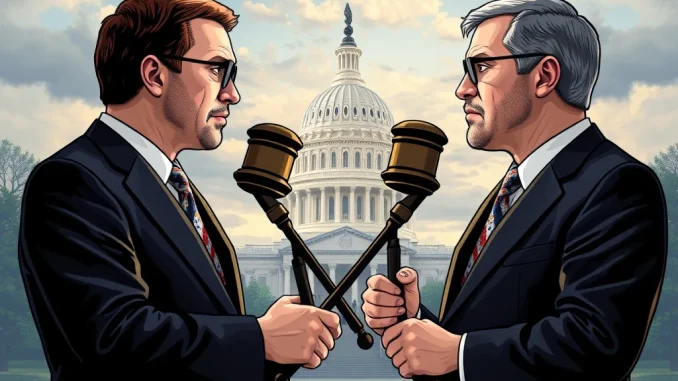
Ever wondered if the public face of cryptocurrency regulation tells the whole story? A recent interview with former U.S. House Financial Services Committee Chair Patrick McHenry throws fascinating light on this question, specifically regarding the public posture of SEC Chair Gary Gensler on crypto. McHenry’s comments suggest a potential disconnect between Gensler’s private views and his highly public, often perceived as stringent, stance on the digital asset space. This raises critical questions about the forces shaping SEC crypto policy and its impact on the industry.
Understanding the McHenry-Gensler Dynamic on Crypto Regulation
The core of the recent discussion comes from an interview given by Patrick McHenry to Crypto in America host Eleanor Terrett. McHenry, who recently stepped down as chair of the influential House Financial Services Committee and has been a vocal figure in US crypto policy debates, offered a candid perspective on his interactions with the head of the Securities and Exchange Commission.
According to a preview shared by Terrett, McHenry indicated that his private conversations with Gary Gensler presented a less overtly anti-crypto viewpoint than what the public often sees and hears from the SEC chairman. This observation from a senior former legislator carries weight, given McHenry’s direct engagement with Gensler and the SEC on numerous occasions concerning digital asset legislation and oversight.
Why Might a Public Stance Differ from Private Views?
McHenry’s suggestion is that political considerations played a significant role in shaping Gensler’s public approach to crypto. Specifically, he pointed towards Senate politics and the dynamics surrounding confirmation processes. This isn’t an uncommon phenomenon in Washington D.C., where the need to navigate political landscapes, secure approvals, and maintain support can influence how officials communicate their positions on sensitive or emerging issues.
- Senate Confirmation: High-level appointments like the SEC Chair require Senate approval. Demonstrating a tough stance on perceived risks or areas of concern can sometimes help garner support from key senators or address potential criticisms during confirmation hearings.
- Political Climate: The broader political environment and party priorities can influence regulatory rhetoric. If there is political pressure to be seen as cracking down on a new or controversial industry, it can impact public statements.
- Public Perception: Shaping public perception and managing expectations about the regulator’s role can also be a factor in crafting public messages.
This potential duality in stance highlights a challenge for the crypto industry seeking clear and consistent guidance. When the public messaging is perceived as primarily driven by political strategy rather than purely regulatory or economic analysis, it can foster uncertainty and make compliance efforts more difficult.
The Impact of SEC Crypto Stance on the Industry
The SEC’s position on cryptocurrencies is arguably the single most significant factor influencing the development and adoption of digital assets in the United States. Enforcement actions, public statements, and regulatory frameworks (or lack thereof) emanating from the SEC directly affect:
- Whether specific tokens are deemed securities.
- How crypto exchanges and platforms operate.
- The ability of crypto companies to raise capital.
- Investor confidence and participation.
- The competitive position of the US in the global crypto landscape.
If McHenry’s assessment is accurate, and the public stance is heavily influenced by politics, it suggests that the regulatory environment is perhaps less about inherent risks or benefits of the technology itself, and more about navigating the complex currents of Washington. This could be seen as a significant challenge for an industry that thrives on innovation and requires regulatory clarity to build and grow effectively within the US.
Navigating the Uncertainty in US Crypto Policy
The comments from Patrick McHenry underscore the complexities and sometimes opaque nature of US Crypto Policy. For businesses, developers, and investors in the crypto space, this environment presents challenges:
- Lack of Clear Rules: The absence of tailored legislation means the industry often operates under the shadow of potential enforcement based on interpretations of existing laws, sometimes feeling reactive rather than proactive.
- Communication Gaps: If public statements are politically colored, discerning the SEC’s true long-term intentions or underlying regulatory philosophy becomes harder.
- Innovation Hurdles: Regulatory uncertainty can stifle innovation, pushing companies or talent to jurisdictions with clearer or more favorable rules.
What are the actionable insights here? For those involved in the crypto ecosystem, engaging with policymakers, advocating for clear legislative frameworks, and staying informed about the nuances of regulatory discussions are crucial. Understanding the potential political dimensions, as highlighted by McHenry, is part of navigating this complex landscape.
What Does This Mean for the Future of Crypto Regulation?
McHenry’s tenure as Chair saw significant efforts in the House to pass bipartisan legislation aimed at creating a clearer framework for digital assets, including the Financial Innovation and Technology for the 21st Century Act (FIT21). While these efforts have progressed in the House, the path forward in the Senate remains less certain, reflecting the broader political divisions that McHenry referenced.
The tension between different branches of government, different political ideologies, and different regulatory philosophies continues to shape the debate around Crypto Regulation in the US. Comments like McHenry’s serve as reminders that the process is not purely technical or legal; it is deeply intertwined with political strategy and dynamics.
Moving forward, the industry and policymakers alike face the task of finding a path towards regulation that protects consumers and ensures market integrity while also fostering innovation. The insights shared by figures like Patrick McHenry are vital pieces of the puzzle in understanding the forces at play.
Conclusion: Politics, Policy, and the Future of SEC Crypto
Patrick McHenry’s assertion that Gary Gensler‘s public SEC crypto stance was influenced by political considerations offers a compelling, albeit potentially controversial, perspective on the state of US Crypto Policy. It suggests that the perceived strictness or ambiguity emanating from the SEC might be, in part, a product of navigating the political currents in Washington, rather than solely a reflection of the agency’s technical assessment of digital assets.
This insight underscores the challenges facing the crypto industry in the United States – a landscape where regulatory clarity is paramount but potentially complicated by political dynamics. As the debate around effective Crypto Regulation continues, understanding the various influences, including political ones, is key to anticipating future developments and advocating for a framework that allows the digital asset space to mature responsibly within the US.
The conversation initiated by McHenry is a critical reminder that the path to clear and effective crypto regulation is paved not just with legal interpretations and technological understanding, but also with the complex realities of the political arena.



